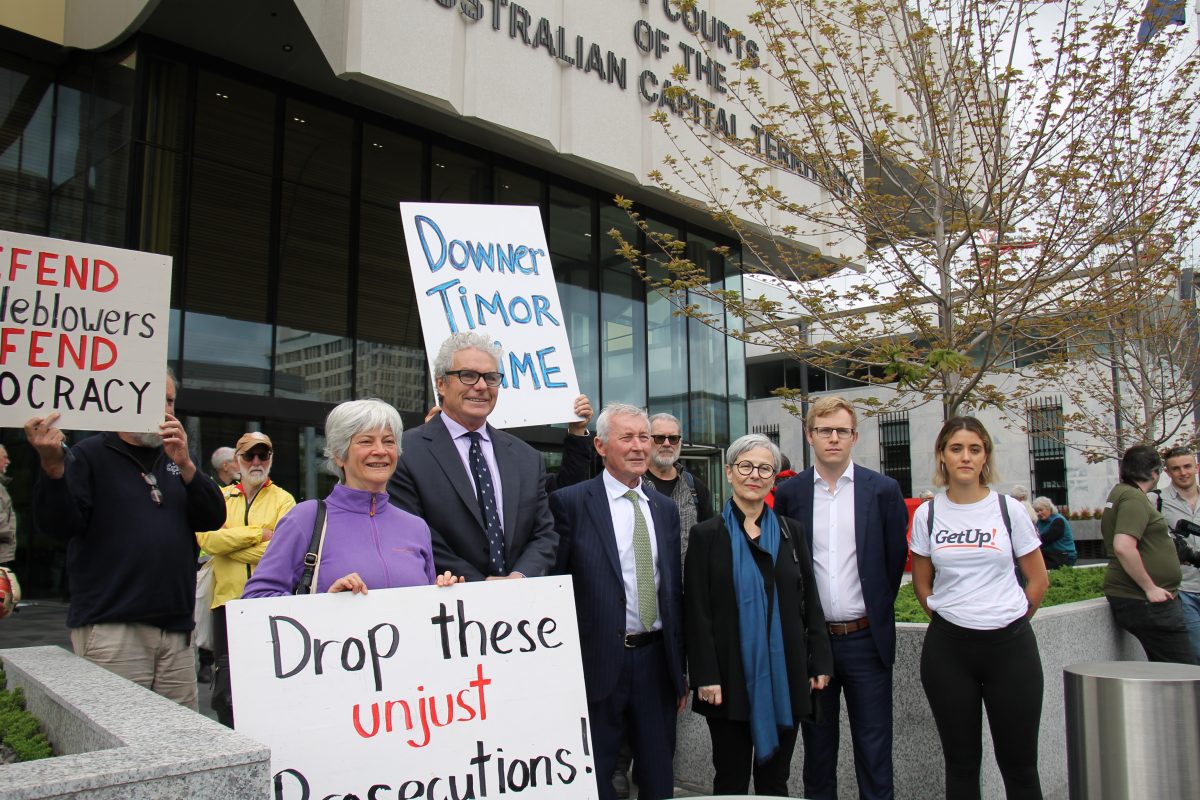
David McBride is in custody after his sentencing earlier this year. Photo: Albert McKnight.
Not many convicted criminals would be met with a round of applause when they enter a courtroom, but that is what happened to David McBride on Wednesday (9 October).
When he last faced the ACT Supreme Court in May 2024, the then-60-year-old was sentenced to five years and eight months in jail.
He was met with a packed courtroom gallery of supporters when he was led into the court again. They called out to him and clapped as he sat down next to a custodial officer, smiling.
McBride plans on appealing against his convictions and sentence. But he had to seek leave to lodge an appeal as the date to do so had passed.
A defendant must appeal their conviction or sentence within 28 days of it being made, otherwise an appeal lodged after that time is considered to be ‘out of time’ and needs leave to do so.
The court heard the Commonwealth Department of Public Prosecutions didn’t oppose McBride’s application to appeal.
Registrar Jayne Reece said it was appropriate to grant the application, and the court heard that prosecutor Conor McCraith would not challenge her decision.
Barrister Kieran Ginges, representing McBride, estimated the appeal could take up to a whole day.
The matter will return to court on 17 October to set a date for the appeal to be heard, likely to be sometime in March 2025.
McBride’s supporters cheered and clapped again as he was led out of the courtroom back to jail.
Court documents say he had been a lawyer with a high-level security clearance and held the rank of major in the Australian Army.
When police raided his home in February 2018, they seized 235 documents that had been stolen from Australian Defence Force (ADF) facilities – 207 of which were classified as secret.

In 2022, David McBride (second from left) was joined outside the ACT Courts by whistleblower Bernard Collaery (centre), who had his charges dropped by the Attorney-General. Photo: Claire Fenwicke.
McBride had a number of complaints about the ADF management and had made a submission to the Inspector General of the Australian Defence Force (IGADF) in August 2014, which included many secret documents.
One of his complaints was that special forces soldiers involved in the deaths of civilians in Afghanistan were being investigated by military police even where there was no reasonable suspicion that the war crime of murder had been committed.
The IGADF began an inquiry into his claims. Meanwhile, McBride gave his submission and supporting documents to journalists Chris Masters and Andrew Clark, who ultimately didn’t use them for their reporting.
Then, in April 2016, he set up a website on which he published some documents. Afterwards, he was contacted by ABC journalist Dan Oakes, who gave him his IGADF submission and other documents he had taken from ADF facilities.
Mr Oakes used the documents to publish The Afghan Files, which featured allegations that special forces soldiers were unnecessarily killing Afghan civilians.
McBride later told police, “He did do a story on it, but a totally different story to the one that I was pushing”.
After spending years fighting his charges, he pleaded guilty to three charges.
These were one count of theft and two counts of the unauthorised communication of military information to other people while a member of the Defence Force.
When he was sentenced, he was handed a non-parole period of two years and three months, which means he is currently eligible to be released from jail in August 2026.





















Ha ha!!! Thanks for the laugh Sal. :) View